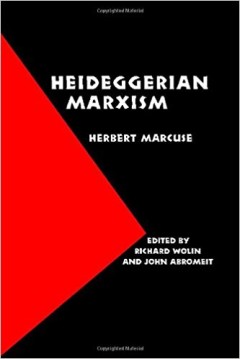Ditapis dengan

The Aesthetic Dimension: Taward a Critique of Marxist Aesthetic
Developing a concept briefly introduced in Counterrevolution and Revolt, Marcuse here addresses the shortcomings of Marxist aesthetic theory and explores a dialectical aesthetic in which art functions as the conscience of society. Marcuse argues that art is the only form or expression that can take up where religion and philosophy fail and contends that aesthetics offers the last refuge for two…
- Edisi
- -
- ISBN/ISSN
- 0807015180
- Deskripsi Fisik
- xiii + 88 pg.; 28 cm.
- Judul Seri
- -
- No. Panggil
- 335.411 MAR a

Heideggerian Marxism
The Frankfurt School philosopher Herbert Marcuse (1898–1979) studied with Martin Heidegger at Freiburg University from 1928 to 1932 and completed a dissertation on Hegel’s theory of historicity under Heidegger’s supervision. During these years, Marcuse wrote a number of provocative philosophical essays experimenting with the possibilities of Heideggerian Marxism. For a time he believed th…
- Edisi
- -
- ISBN/ISSN
- 9780803283121
- Deskripsi Fisik
- xxx + 227 pg.; 27,5 cm.
- Judul Seri
- -
- No. Panggil
- 191 MAR h
 Karya Umum
Karya Umum  Filsafat
Filsafat  Agama
Agama  Ilmu-ilmu Sosial
Ilmu-ilmu Sosial  Bahasa
Bahasa  Ilmu-ilmu Murni
Ilmu-ilmu Murni  Ilmu-ilmu Terapan
Ilmu-ilmu Terapan  Kesenian, Hiburan, dan Olahraga
Kesenian, Hiburan, dan Olahraga  Kesusastraan
Kesusastraan  Geografi dan Sejarah
Geografi dan Sejarah